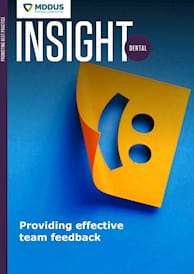These cases are based on actual calls made to MDDUS advisers and are published here to highlight common challenges within dental practice. Details have been changed to maintain confidentiality.
Responding to negative online reviews
Q. A small number of patients have left negative (and in our view unfair) reviews on the practice's Facebook page in regard to care received at our surgery. How should we respond?
It’s natural to feel upset or defensive about negative online feedback. The knee-jerk reaction may be to reply immediately to the post to set the record straight but it is best to take time and reflect. Responding directly online to the review could result in a breach of your patient's confidentiality. Our advice in these circumstances is to limit any response to a simple acknowledgement of the concern and to provide a link to your practice complaints policy. You should not go into any specific detail about the patient making the comment.
If you are able to identify specific patients and are certain they have posted the comments, you could consider making direct contact (not on social media). This could be in the form of a letter or email expressing regret for the discontent noted online and inviting the patient to raise their concerns directly via the complaints procedure.
GDP leads or practice managers are advised to establish and regularly review policies on social media use and provide staff guidance on how to deal with online feedback. Read more in our advice article Responding to online practice criticism.
Appointing a new senior administrator
Q. Our practice currently has a team of six admin and reception staff. We would like to introduce the role of senior administrator to manage the day-to-day running of the team. We have identified an individual to whom we would prefer to offer the role. Are we obliged first to advertise the position?
There is no legal obligation to advertise the post, so you could just offer it to your preferred choice. You would just need to ensure that there are no possible discrimination issues that other staff could raise – such as age, race or disability. However, to avoid potential grievances, the best course of action may be to run an advert internally for a week to allow anyone to apply and then carry out interviews so you can justify who gets the job, i.e. that you select the best candidate with the right skills for the job.
Lasting power of attorney
Q. A patient at our practice has dementia and may lack capacity. Her son claims to have power of attorney and is asking for access to her dental records. How should we handle this request?
The first thing is to establish whether the patient has capacity to make the decision to allow her son access. It may be appropriate to seek input from the patient’s GP, if consent can be obtained. If the patient is deemed to have capacity the practice would then require her consent to disclose personal information to her son. If she does not have capacity, decisions regarding disclosure must be of overall benefit to her, and you should have no reason to believe the patient would have objected to sharing information with her son. See GDC guidelines for further information.
Although relevant legal frameworks differ across the UK, there are common themes. In all jurisdictions there is the option for a patient, before capacity is lost, to appoint a legally recognised medical proxy decision-maker to make medical decisions at such time as they may lose capacity. A power of attorney appointed in relation to health and welfare would be entitled access to relevant clinical information about the patient. Other disclosures (including requests from financial and property attorneys) should only be granted if it is of overall benefit to the patient.
In this case it would be necessary first to ask the son for proof of lasting power of attorney (health and welfare) in the form of registered paperwork (and this should be recorded in the notes), and to understand more about the purpose for which the information is required. It is unlikely to be appropriate to provide full access to the patient’s medical/dental records and any disclosure made should be proportionate and relevant to its purpose.
Nursing registration lapsed
Q. One of our dental nurses just returned from a two-week holiday and at lunch time today discovered that she had neglected to pay her annual retention fee with the General Dental Council and her registration has lapsed. She assisted in consultations with three patients this morning before discovering the oversight. What should the practice do? The nurse has already contacted the GDC to reinstate her registration.
As soon as a dental practitioner realises their registration has lapsed, they must stop any clinical work immediately until the GDC has processed their application to be restored to the register (which may take several weeks). As the nurse has technically been practising illegally, it may be wise for her to seek advice from her defence organisation. Practices are advised to have a formal process in place to monitor team members’ registration to ensure such an oversight does not happen again. This may involve a new practice policy requiring all registered members of the healthcare team to produce regular evidence of their GDC registration and a diary system seeking renewed certificates at the end of the relevant period of registration. Find out more in this MDDUS advice article.
Updating medical history
Q. We currently ask patients to formally update and sign their medical histories on paper every six to 12 months, but would like to make this process completely digital. Do we still need a patient’s signature, and how often should we be updating?
The General Dental Council’s Standards guidance (principle 4.1.1) makes it clear that “You must make and keep complete and accurate patient records, including an up-to-date medical history, each time that you treat patients.” As a minimum, the practice may wish to consider verbally checking with patients at each attendance that their medical history has not changed (and noting this in the patient record). Some practices choose to use a structured health record questionnaire form that is signed by the patient and regularly updated.
Remember that, in the event of an adverse incident, the practice will be asked to demonstrate that they were fully aware of the patient’s medical history and that any treatment planning decision/advice was provided in that context. In terms of patients signing their medical history, this can easily be done digitally. A number of systems are available (Clinipad and similar), but the patient must use a signature and not a typed name. Further guidance is available in this CQC mythbuster article on dental care records.
IRMER for dental nurse
Q. One of the practice dental nurses is qualified to take radiographs. However, she’s just noticed that her IRMER training has recently expired. Is she allowed to continue taking radiographs while she arranges to update her training?
Dental care professionals in the UK who wish to take and/or process radiographs are required by law to undergo appropriate training in line with the requirements of the Ionising Radiation (Medical Exposure) Regulations (IR(ME)R). This includes undertaking “continuing education” after qualifying. These regulations are monitored and enforced across the UK by Healthcare Improvement Scotland, the CQC (England), Healthcare Inspectorate Wales and the Regulation and Quality Improvement Authority (Northern Ireland). The General Dental Council also “highly” recommends that registrants complete five hours of enhanced CPD in radiography/radiation protection during each five-year CPD cycle.
MDDUS can’t advise whether or not your nurse should continue taking radiographs. But if she did so, she would have to be prepared to justify her decision if she was found not to have complied with the requirements.
You also have to think about your own professional obligations in relation to delegation. GDC Standards are clear that you should only delegate a task to another team member if you are confident that they have been trained and are both competent and indemnified to do what you are asking. You would therefore have to be satisfied on these aspects before agreeing to the nurse continuing to take radiographs in the period before her training is updated.
It may be helpful to explore options for online training which could help the nurse update her skills and knowledge to the required level more quickly.
This page was correct at the time of publication. Any guidance is intended as general guidance for members only. If you are a member and need specific advice relating to your own circumstances, please contact one of our advisers.
Read more from this issue of Insight Dental

Save this article
Save this article to a list of favourite articles which members can access in their account.
Save to library

